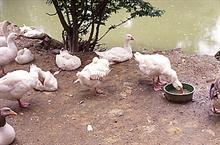 Study Livestock Production for Small Properties
Study Livestock Production for Small Properties
- Follow your passion as a hobby farmer; or explore ways of getting the most from a small acreage.
- Expert qualified tutors with decades of experience
The perfect course if you own or operate a small acreage property and want to run a small number of livestock for profit or pleasure! Perhaps you are considering purchasing acreage with a business idea in mind or you could find a small farming enterprise always set up for sale just ready for you to move in and take over?
Develop the skills to manage livestock confidently whilst ensuring their safety and wellbeing on smaller properties. Raising and caring for livestock, even in small numbers, is challenging and rewarding. This course is ideal for the hobby farmer or enthusiast or for those seeking a change of pace or a country life...
 Study all you need to know from how to manage the farm as a business, how to ensure the practices are sustainable, how to look after the pastures, know about health care provisions and of course you will study animal husbandry - the everyday tough stuff you will need to know for caring for livestock!
Study all you need to know from how to manage the farm as a business, how to ensure the practices are sustainable, how to look after the pastures, know about health care provisions and of course you will study animal husbandry - the everyday tough stuff you will need to know for caring for livestock!
Is it time for you to feel the rewards of having your own small acreage farm?!
Modules
Note that each module in the Qualification - Certificate in Small Acreage Farming (Livestock) is a short course in its own right, and may be studied separately.
What is Viable?
Farms do not need to be hundreds or even dozens of acres to be viable.
Viability depends more on what you are farming; how you farm, and what you are trying to achieve on a farm.
 Small Acreage farms can fall into a number of categories:
Small Acreage farms can fall into a number of categories:
- Hobby Farms - Where the property owner is motivated by the experience and the lifestyle; and the need to operate on a commercially viable scale is not critical
- Self Sufficiency Farms -Where the primary to grow produce for the families use, rather than for selling
- Small Farms that Contribute to Income -The farm is not the sole source of income for the farmer and their family; but it may contribute to their income
- Commercially Profitable Small Farms -These properties need to be sophisticated operations that are designed to make optimum use of the limited area available. Technology can offer opportunities that might not have been available on small properties in the past; and by carefully selecting what livestock to farm, it can be possible to optimise productivity per acre. Further value can be added by processing what is grown on the property; so that a higher return can be achieved (eg. Instead of selling milk from dairy goats; you might make gourmet cheese from the milk and sell the cheese).
A lot can be produced on as little as a couple of acres. Commercial poultry or fish farms, for instance, can be sufficiently productive on 2 or 3 acres to generate an income that supports an entire family.
More intensive farming on smaller acreages may however require more sophisticated and intensive farming practices.
Keep the Property in Good Condition
First there was subsistence farming. Then there was a technological revolution: developments in machinery and chemicals allowed us to clear and cultivate land faster, feed plants and animals quicker (and grow them faster); and kill pests or diseases quickly. These newfound abilities seemed like a godsend to mankind; and throughout the 20th century we used them to their fullest, generally with little regard to any unforeseen repercussions.
Gradually, time has revealed a variety of problems caused by this modern agricultural development; including; chemical residues affecting plant and animal life on land and in the sea, soil degradation in the form of soil structural decline, erosion, salinity, soil acidification, loss of fertility, nutrient loading of waterways, dams and lakes and more.
As we move into the 21st century and concern about our environment grows, there is an obvious move towards more sustainable farming.
Sustainable farming is in essence concerned with anything that affects the sustainability of a farm. You cannot keep farming a property indefinitely if there is a degradation of resources (environmental resources, financial resources, equipment, machinery, materials, or any other resources). In the short to medium term, the problem of sustainability is overwhelmingly a financial one; but in the long term, environmental sustainability will have perhaps more impact upon the whole industry than anything else.
